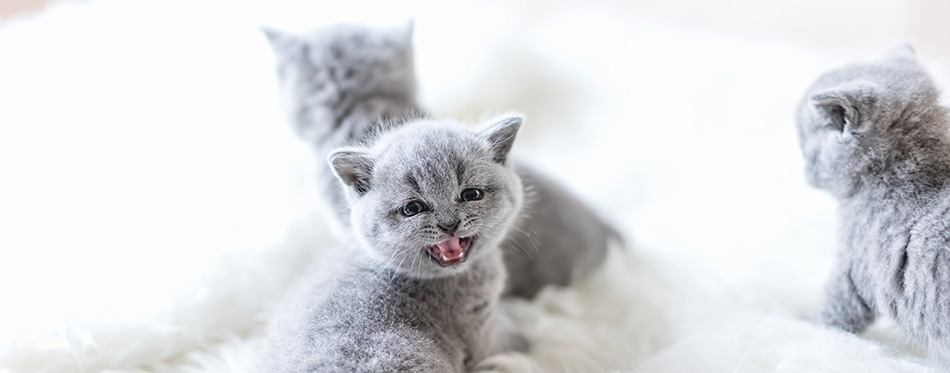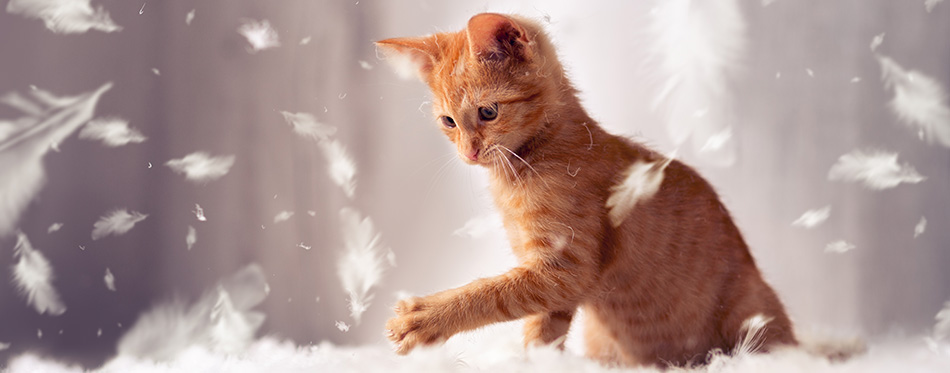Teething is a natural part of growing up for many animals including humans. We hear a lot about dogs teething and about what we can do to help them with the discomfort. So, do kittens lose their teeth, and do we as cat owners have to do anything about it? Yes, they do and it’s a good idea for cat owners to learn about the process.
We have researched all the top advice on kittens teething and compiled this comprehensive guide packed with factual information and practical tips.

When Do Kittens Lose Their Baby Teeth?
You may be surprised to learn that kittens teeth twice in their lifetime and this can cause some confusion amongst pet owners. Kittens are born without teeth and then at about 4 weeks of age their baby teeth erupt from their gums. These may also be called the milk teeth or deciduous teeth.
They have six incisors at the top and six at the bottom. These are at the front of the mouth and are used for grasping food. This type of deciduous teeth begin to emerge at about three to four weeks of age.
Their canine teeth (two teeth at the top and two at the bottom) are the larger pointed teeth that are used for tearing meat. These new teeth emerge at around three to four weeks of age.
The premolar teeth are located behind the canines (six at the top and four on the bottom) and are used for grinding up food. However, these don’t emerge from the kitten’s mouth until they are five to six weeks old. Young kittens do not have molars – these will develop later during a second teething when the permanent teeth develop.
The deciduous teeth are lost at around 11 weeks when the adult teeth develop and emerge.
Teething Kitten Signs to Look Out For
Many owners ask do kittens teeth in a particular way and is it unpleasant for them? No one wants their little fur ball to be in pain. There is no indication that the teething process is terribly painful for cats but here are some of the signs that they may be teething:
- Teeth missing: During you kitten’s second teething, you may find a baby tooth around your house. You may find a tooth in a food bowl or on the floor. Do not be alarmed! This is just a sure sign that your kitten is teething.
- Less interest in food: Teething kittens may have sore gums and a sore mouth and this can make it hard to chew. It is best to feed teething cats soft pet food which will be more comfortable for them to eat so try switching to wet food at this time.
- Pawing at mouth and sensitivity: Your kitten may try to dislodge loose teeth by pawing at their mouth. They will probably not like you touching this area at this time as it can be very sensitive. Avoid brushing their teeth during this stage.
- Chewing a lot: The teething process can involve chewing a lot as this may relieve some of the discomfort of inflamed gums. You should try to direct this towards acceptable objects such as chew toys rather than your fingers. There is a great selection of cat chew toys here.
- Irritable mood: You may find that your little fur ball is a bit grumpy when they are teething. This is not surprising as sore gums are no fun. It can be upsetting as a new pet parent but don’t take it personally – just give your pet some space.
- Mild gum bleeding: As a baby tooth leaves the gum, it can cause a small amount of bleeding. However, this should be very mild and can be helped by using soft pet food. You may notice just a few drops of blood in food or water bowls or on toys. Severe bleeding needs to be checked out by a veterinarian.
- Less grooming: As your kitten reaches teething, you may notice that they groom themselves less. This will soon pass and they will start their grooming routine again.
Cat Teething Timeline
Do cats teeth at a certain age? Yes, they do! Of course, it can vary from cat to cat but this is an average kitten teething timeline.
- 0 – 2 weeks: Baby kittens are born with no teeth
- 2 – 4 weeks: Most kittens start to develop their baby teeth
- 5 – 8 weeks: 26 baby kitten teeth fully erupt
- ~ 11 weeks: Baby teeth begin to fall out
- 3-4 months: Adult teeth erupt starting with incisors then canines, premolars, and molars
At six months, it is a good idea to book a veterinarian check up to make sure that all of your young cat’s teeth have erupted correctly. Any required dental care can be carried out before lasting damage is done. By seven months of age kitten teething should be over and all of the 30 adult teeth should have erupted.
What Can Go Wrong With Baby Teeth in Cats?
Sometimes a baby tooth does not fall out and there is not enough space for the adult tooth to erupt. Retained baby teeth can cause a problem so it is important that you get advice from your veterinarian. Retained deciduous teeth can result in overcrowding, cracked teeth, and misalignments. Your veterinarian may have to surgically remove the retained tooth so that the permanent tooth can emerge in the normal way.
When a kitten is teething they can also develop infections and this can cause a characteristic breath odor. The gums may also be red and inflamed and there may even be a discharge.
As with humans, kitten teeth can be misaligned so that the top and bottom teeth do not fit together correctly as your little pet chews. It can put them off their food as it is not easy for them to chew. Also, kitten’s teeth sometimes grow in the wrong direction so that they impact other teeth or damage the delicate lining of the cheek and mouth.

What to Expect After Teething in Cats
Do cats lose teeth during adulthood? No, adult cats should not lose their adult teeth unless they have dental disease. An injury to the face and mouth can cause the loss of healthy teeth. With proper care and attention and a good diet your cat’s permanent teeth should last them well into their senior years!
Care of Cat Adult Teeth
You can do a lot to look after your cat’s teeth and there are plenty of health benefits associated with healthy teeth and gums. It is important that you learn how to brush your cat’s teeth properly and we have prepared a comprehensive article on this. The important message is that you should brush your cat’s teeth regularly and using the correct equipment. Do not use human toothpaste for kitty dental care, instead take a look at our recommended selection of cat toothpaste. It is also vital that you choose the correct type of toothbrush for cat dental care and we have the top products listed here.

